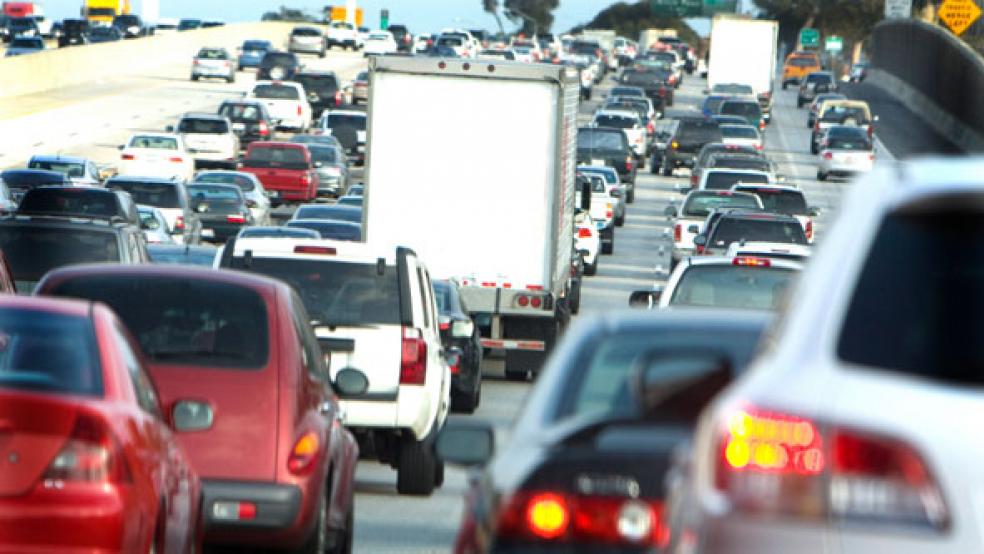David Guernsey, chief executive of Guernsey Office Products, knows exactly the solution to his business problem: more taxes.
His northern Virginia-based company puts 100 vehicles on the road each day delivering office supplies in the metropolitan Washington, D.C. area, and he has watched the busy roads turn more and more congested over the past decade. Exasperated by years of under-investment in the region’s transportation infrastructure, Guernsey and other businessmen who traditionally have been allied with the GOP are locking horns with Republican Gov. Bob McDonnell over their desire to make new taxes part of a comprehensive package to ease congestion. Without substantial improvements in highways, bridges and roadways, they say, businesses will lose billions of dollars annually on lost time in traffic.
As midterm elections approach, the Tea Party and other anti-tax groups have been garnering headlines across the country, which makes the push by Washington, D.C. area businesses to boost taxes for transportation something of an anomaly.
Virginia Republicans, who build political careers on vows not to increase taxes, “draw these ideological lines,” Guernsey said in a recent interview with The Fiscal Times, “and all that happens is people sit in traffic.” The recession squeezed funds for transportation and other priorities in nearly every state, but it has exacerbated longer-term trends in places with serious congestion problems, like northern Virginia.
Dozens of regional business owners have joined forces as the Northern Virginia Transportation Alliance, and late last year passed a resolution calling for new taxes to finance transport spending. Virginia balanced its budget with draconian cuts at the legislative session that ended a few weeks ago, hacking $6 billion out of a budget that was only $34 billion to begin with. Separate transportation funds generally get money from gasoline taxes and other things.
The alliance likes to point out that since the last time the gas tax went up — on Jan. 1, 1987 by 2.5 cents, to 17.5 cents per gallon — its purchasing power has declined by half. These businesses view higher taxes as an investment in business, rather than a pointless burden they have to bear — an idea they hope legislators in the capital, Richmond, will embrace.
McDonnell, who won election last November in part on a no-new-taxes pledge, is resisting a transportation tax increase, even as legislators in Richmond have discussed giving the governor some political cover by rebranding the gas tax as a “user fee.” Without an increase in the gasoline tax, the governor’s options for increasing the flow of cash to transportation are limited.
A plan to devote revenues from offshore drilling vanished when President Obama banned new wells in the wake of the catastrophic Gulf of Mexico oil spill. State Democrats refused to back a plan to use part of Northern Virginia sales taxes to fund transportation programs. The governor has also advocated selling state liquor stores, a transaction that he says would net $500 million up front, but then cost the state $100 million in lost revenue each year.
During the campaign, McDonnell promised to devote about $1.5 billion more to transportation in Virginia, but his various schemes to raise more money have been widely panned. Spending in Virginia on new road projects has all but come to standstill.
In 2009, following a pattern set in prior years, Richmond siphoned off more than 50 percent of a $617 million fund devoted to highway construction, and diverted it to maintenance of existing roads. If the trend continues, Virginia will lose access to federal matching funds for maintenance, as well, something that can only aggravate commuters more.
The Texas Transportation Institute, in its 2009 Urban Mobility Report, ranked congestion in the Washington area among the worst in the nation, after Los Angeles, based on the extra time needed to complete typical trips and the excess fuel burned. With each area commuter spending 62 extra hours in the car, lost time in traffic cost the region about $2.8 billion.
The Northern Virgina Transportation Alliance argues that Virginia needs a steady $1.6 billion annually for maintenance and construction. Beyond acute problems, like widening I-66, a main east-west artery, business owners argue that the region needs highways that allow traffic to move between outer Virginia suburbs, and a bypass that allows southbound traffic to steer east of Washington and avoid the Beltway altogether.
So far, McDonnell is not budging. “It is just not an option to raise taxes,” said Stacey Johnson, the governor’s spokeswoman. “That’s clear.”
Privately, legislators more amenable to taxes and business advocates believe the political environment is ripening in their favor, if for no other reason than that McDonnell has very few options but some kind of new revenue stream.
“I think at the end of the day he will come to the realization that it cannot be done with existing resources,” said Thomas Rust, a Delegate to the General Assembly who represents a gridlocked part of Northern Virginia. “But we are certainly not there yet.”
His northern Virginia-based company puts 100 vehicles on the road each day delivering office supplies in the metropolitan Washington, D.C. area, and he has watched the busy roads turn more and more congested over the past decade. Exasperated by years of under-investment in the region’s transportation infrastructure, Guernsey and other businessmen who traditionally have been allied with the GOP are locking horns with Republican Gov. Bob McDonnell over their desire to make new taxes part of a comprehensive package to ease congestion. Without substantial improvements in highways, bridges and roadways, they say, businesses will lose billions of dollars annually on lost time in traffic.
As midterm elections approach, the Tea Party and other anti-tax groups have been garnering headlines across the country, which makes the push by Washington, D.C. area businesses to boost taxes for transportation something of an anomaly.
Virginia Republicans, who build political careers on vows not to increase taxes, “draw these ideological lines,” Guernsey said in a recent interview with The Fiscal Times, “and all that happens is people sit in traffic.” The recession squeezed funds for transportation and other priorities in nearly every state, but it has exacerbated longer-term trends in places with serious congestion problems, like northern Virginia.
Dozens of regional business owners have joined forces as the Northern Virginia Transportation Alliance, and late last year passed a resolution calling for new taxes to finance transport spending. Virginia balanced its budget with draconian cuts at the legislative session that ended a few weeks ago, hacking $6 billion out of a budget that was only $34 billion to begin with. Separate transportation funds generally get money from gasoline taxes and other things.
The alliance likes to point out that since the last time the gas tax went up — on Jan. 1, 1987 by 2.5 cents, to 17.5 cents per gallon — its purchasing power has declined by half. These businesses view higher taxes as an investment in business, rather than a pointless burden they have to bear — an idea they hope legislators in the capital, Richmond, will embrace.
McDonnell, who won election last November in part on a no-new-taxes pledge, is resisting a transportation tax increase, even as legislators in Richmond have discussed giving the governor some political cover by rebranding the gas tax as a “user fee.” Without an increase in the gasoline tax, the governor’s options for increasing the flow of cash to transportation are limited.
A plan to devote revenues from offshore drilling vanished when President Obama banned new wells in the wake of the catastrophic Gulf of Mexico oil spill. State Democrats refused to back a plan to use part of Northern Virginia sales taxes to fund transportation programs. The governor has also advocated selling state liquor stores, a transaction that he says would net $500 million up front, but then cost the state $100 million in lost revenue each year.
During the campaign, McDonnell promised to devote about $1.5 billion more to transportation in Virginia, but his various schemes to raise more money have been widely panned. Spending in Virginia on new road projects has all but come to standstill.
In 2009, following a pattern set in prior years, Richmond siphoned off more than 50 percent of a $617 million fund devoted to highway construction, and diverted it to maintenance of existing roads. If the trend continues, Virginia will lose access to federal matching funds for maintenance, as well, something that can only aggravate commuters more.
The Texas Transportation Institute, in its 2009 Urban Mobility Report, ranked congestion in the Washington area among the worst in the nation, after Los Angeles, based on the extra time needed to complete typical trips and the excess fuel burned. With each area commuter spending 62 extra hours in the car, lost time in traffic cost the region about $2.8 billion.
The Northern Virgina Transportation Alliance argues that Virginia needs a steady $1.6 billion annually for maintenance and construction. Beyond acute problems, like widening I-66, a main east-west artery, business owners argue that the region needs highways that allow traffic to move between outer Virginia suburbs, and a bypass that allows southbound traffic to steer east of Washington and avoid the Beltway altogether.
So far, McDonnell is not budging. “It is just not an option to raise taxes,” said Stacey Johnson, the governor’s spokeswoman. “That’s clear.”
Privately, legislators more amenable to taxes and business advocates believe the political environment is ripening in their favor, if for no other reason than that McDonnell has very few options but some kind of new revenue stream.
“I think at the end of the day he will come to the realization that it cannot be done with existing resources,” said Thomas Rust, a Delegate to the General Assembly who represents a gridlocked part of Northern Virginia. “But we are certainly not there yet.”





